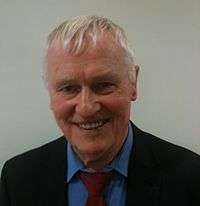Peter McParland
|
Peter McParland at Villa Park, 16 March 2013 | |||
| Personal information | |||
|---|---|---|---|
| Full name | Peter James McParland | ||
| Date of birth | 25 April 1934 | ||
| Place of birth | Newry, County Down, Northern Ireland, UK | ||
| Height | 6 ft 1 in (1.85 m) | ||
| Playing position | Striker | ||
| Senior career* | |||
| Years | Team | Apps | (Gls) |
| 1951–1952 | Dundalk | 14 | (2) |
| 1952–1962 | Aston Villa | 293 | (98) |
| 1962–1963 | Wolverhampton Wanderers | 21 | (10) |
| 1963–1964 | Plymouth Argyle | 38 | (15) |
| 1964–1965 | Worcester City | ? | (11) |
| 1965 | Toronto Inter-Roma | ||
| 1965 | Peterborough United | 0 | (0) |
| 1965–1967 | Worcester City | ? | (7) |
| 1967–1968 | Atlanta Chiefs | 54 | (14) |
| 1968–1971 | Glentoran | 7 | (3) |
| National team | |||
| 1954–1962 | Northern Ireland | 34 | (10) |
| Teams managed | |||
| 1968–1971 | Glentoran | ||
| 1980 | Hong Kong | ||
|
* Senior club appearances and goals counted for the domestic league only. | |||
Peter James McParland MBE (born 25 April 1934 in Newry, County Down, Northern Ireland) is a former professional footballer.
Club career
Dundalk
McParland was spotted playing for Dundalk in the League of Ireland by Aston Villa manager George Martin. Martin signed McParland for a fee of £3,880.
Aston Villa
McParland holds a unique place in English football history as the first player in the game to score in and win both English major domestic knockout Finals. One of the finest headers and strikers of the ball of the past fifty years, he is regarded as one of the greatest players to represent both Aston Villa and Northern Ireland.
During his time with Aston Villa, McParland got influenced by Jimmy Hogan,[1] later won the FA Cup in 1957, scoring twice in the final against Manchester United but also becoming involved in a controversial incident in which he shoulder-charged (at the time a legitimate form of challenge) the Manchester United keeper after only 6 minutes which left United's goalkeeper, Ray Wood, unconscious with a broken cheekbone. McParland's two-goal haul is remembered fondly as an example of his all-round abilities as a player showcasing his diving header and volleying techniques.
McParland also won the Second Division title in 1960 and the League Cup in 1961 while with Aston Villa. He was on the scoresheet for the second leg of the 1961 League Cup final, when Villa overturned a 2–0 deficit against Rotherham United to win the second leg 3–0 at Villa Park and become the winners of the first Football League Cup.
Wolverhampton Wanderers and Plymouth Argyle
Following Aston Villa, McParland joined local rivals for a brief spellWolverhampton Wanderers in 1962. Although he was only there for one season, he did manage to score 10 goals in 21 games. The following season McParland moved on to Plymouth Argyle, his final English league club (although he later turned out for Worcester City in the Southern League), before hanging up his boots. In 1965, McParland was recruited to play for inter-Roma FC of Toronto of the Eastern Canadian Professional Soccer League. He scored many memorable goals especially the one against the Hamilton Steelers to give his side the victory.
McParland played for the Atlanta Chiefs of the North American Soccer League in 1967 and 1968.[2] He ended his career as player-manager of Glentoran.[3]
International career
McParland represented Northern Ireland 34 times and scored twice in his debut against Wales in 1953–54 season.
He also starred for Northern Ireland in the 1958 FIFA World Cup in which he scored five goals and helped his team to the quarter-finals. France defeated Northern Ireland 4–0 in the quarter-final.
He holds the record for being the highest-scoring Northern Irish player in World Cup finals history.
In April 2015, the feature-length documentary Spirit of '58 was screened as part of the Belfast Film Festival. It featured Peter McParland prominently alongside the other surviving players (Billy Bingham, Billy Simpson, Jimmy McIlroy and Harry Gregg) as it told the story of Northern Ireland's journey throughout the 1950s under the managership of Peter Doherty, culminating in the 1958 World Cup.
International goals
Scores and results list Northern Ireland's goal tally first.
| # | Date | Venue | Opponent | Result | Competition |
|---|---|---|---|---|---|
| 1 | 31 March 1954 | Wrexham, Wales | | 2–0 | 1954 British Home Championship |
| 2 | 31 March 1954 | Wrexham, Wales | | 2–0 | 1954 British Home Championship |
| 3 | 11 June 1958 | Halmstad, Sweden | | 1–3 | 1958 FIFA World Cup |
| 4 | 15 June 1958 | Malmö, Sweden | | 2–2 | 1958 FIFA World Cup |
| 5 | 15 June 1958 | Malmö, Sweden | | 2–2 | 1958 FIFA World Cup |
| 6 | 17 June 1958 | Malmö, Sweden | | 2–1 | 1958 FIFA World Cup |
| 7 | 17 June 1958 | Malmö, Sweden | | 2–1 | 1958 FIFA World Cup |
| 8 | 22 April 1959 | Wrexham, Wales | | 4–1 | 1959 British Home Championship |
| 9 | 22 April 1959 | Wrexham, Wales | | 4–1 | 1959 British Home Championship |
| 10 | 9 November 1960 | Glasgow, Scotland | | 2–5 | 1961 British Home Championship |
References
- ↑ "How total football inventor was lost to Hungary". The Guardian. 22 November 2003. Retrieved 12 September 2010.
- ↑ "NASL". Nasljerseys.com. 1934-04-25. Retrieved 2016-10-20.
- ↑ "Peter McParland". Birmingham Mail. Retrieved 2016-10-20.
